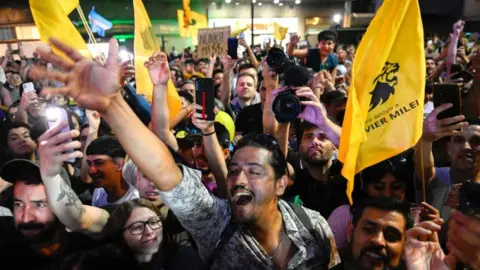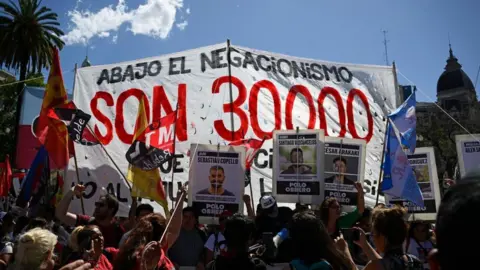Argentina election: Javier Milei's radical proposals face test of reality
 Getty Images
Getty ImagesJavier Milei, the anti-establishment politician who cruised to victory in the Argentine presidential election last week, has courted intense controversy with radical, provocative policy proposals and statements.
This led many detractors of the self-styled "anarcho-capitalist" to call his candidacy a "leap into the void".
Now, with the mop-haired president-elect only two weeks away from taking over Latin America's third-largest economy, many are asking, how will his policies and positions face the test of reality?
Taming inflation takes time
Javier Milei had proposed to dollarise the economy and eliminate the Argentine Central Bank as a strategy to "kill" hyper-inflation. This meant making the US dollar the national currency in place of the Argentine peso, whose value, Mr Milei said, had been "melting like blocks of ice in the Sahara".
 Reuters
ReutersOne obstacle is that ditching the Central Bank and making the US dollar legal tender would need approval from Argentina's Congress and could even require changing the constitution.
Although Mr Milei convincingly won the presidency, his Libertad Avanza (Freedom Advances) movement is barely the third largest political force in Congress. This suggests difficult negotiations might be in store.
Some economists have also questioned whether Mr Milei's plans are feasible, saying they would weaken his government's ability to manage domestic monetary policy.
Having the US dollar as the Argentine currency would effectively leave interest rate policy in the hands of the US Federal Reserve. Argentina's economy would be more vulnerable to external shocks involving the US dollar, for example sudden rises in prices for oil and fuel imports, which could make internal adjustments even more painful inside the country.
Sceptics also point out that Argentina would need to have in hand the US dollars to replace the pesos. Experts believe this could require anywhere between US $35bn to $50bn which indebted Argentina currently does not have and may not be able to borrow easily.
Mr Milei himself has admitted his "shock adjustment" economic stabilisation recipe could actually take up to two years to bring down inflation. "Saying anything else is lying," he said.
A climate sceptic?
Another topic that had made media headlines was Mr Milei's apparent declaration of himself as a climate change "sceptic", that is, someone who denies the role of humans in global warming.
 Getty Images
Getty Images"I do not deny climate change. What I am saying is that there is a temperature cycle in the history of the Earth... Therefore, all those policies that blame humans for climate change are false," Mr Milei said during a presidential debate last month, causing much commentary and criticism.
In his proposed government programme, one of the numerous ministries he had said he planned to axe would be the existing environment ministry.
Such apparent climate scepticism risked putting Mr Milei sharply out of tune with an international majority of governments and leaders who plan to gather at the COP28 climate conference in Dubai soon to seek urgent solutions to the problems of climate change and global warming.
Pragmatism and the Pope
Before he was elected, Mr Milei virulently attacked Argentine Pope Francis, calling him a "Jesuit who promotes communism", and even the "representative of the evil one [the Devil] on Earth".
Such statements caused frictions with the local Catholic Church and the Vatican.
 Reuters
ReutersHowever, this antagonism appeared to miraculously dissipate only days after his election win, when Mr Milei had what he called a "very friendly" phone call with the Pope, whom he addressed as "Your Holiness", inviting him to visit Argentina in 2024.
Asked in a TV interview about this change of heart, Mr Milei conceded that, when one is president, "there are some things that require greater doses of pragmatism".
No break with China and Brazil
Before his election, Milei had signalled he could freeze ties with Brazil and China, Argentina's two top trading partners, on the grounds that he did "not make pacts with communists".
"I am going to be aligned with the United States, Israel, and the free world," he said.
 Getty Images
Getty ImagesNot surprisingly, this assertion caused consternation in Beijing and Brasilia, as well as in Argentina.
A Chinese foreign ministry spokesperson was quoted as warning that it would be a "huge foreign policy mistake" for Argentina to cut ties with countries such as China and Brazil.
Mr Milei's predecessor, outgoing left-wing President Alberto Fernández, had carefully nurtured ties with Beijing and had welcomed an invitation to join Brics, the China-led group which also comprises Brazil, Russia, India, and South Africa.
Experts questioned the wisdom of dismantling a relationship that clearly brought benefits to Argentina, and not only by China being a top market for Argentina's soybean, meat and grains.
China was also helping to prop up Argentina's financial reserves with a major currency swap deal - significant support for a country already heavily indebted to the International Monetary Fund (IMF).
Days after the election, however, there seemed to be clear signs that no major break in relations was planned. The president-elect received a personal letter of "congratulations and good wishes" from Chinese President Xi Jinping and Mr Milei himself made a point of thanking Xi on social media.
Mr Milei's pick for foreign minister, Diana Mondino, also dismissed as "nonsense" any suggestion that there would be a rupture in "commercial relations" with China or Brazil.
In Brazil, Mr Milei's invitation for former President Jair Bolsonaro to attend his 10 December inauguration was interpreted as "unfriendly" towards Brazil's current left-wing President Luiz Inácio Lula da Silva.
But Milei has since said Lula would be "well-received", if he wanted to come.
Dictatorship denial
Mr Milei and his vice-presidential running-mate Victoria Villarruel also ignited intense controversy during the campaign with their position regarding Argentina's 1976-83 military dictatorship.
Defying traditional positions held by Argentina's government and society for the last 40 years, Mr Milei caused outrage by contesting the generally accepted estimate of those abducted and "disappeared" in the dictatorship - 30,000 - asserting the actual number was closer to 9,000.
 Getty Images
Getty ImagesThe candidate argued that the political violence of the 1970s in Argentina was a two-sided "war" in which "the forces of the state committed excesses but the terrorists [anti-government guerrillas] ... [also] committed crimes against humanity".
This equivalence of presentation of the two sides raised howls of protest from groups like the Plaza de Mayo mothers and grandmothers of disappeared persons.
This was just another striking way in which the Milei-Villarruel duo were trying to shake up the political status quo in Argentina. The next four years will show if they can do it.
